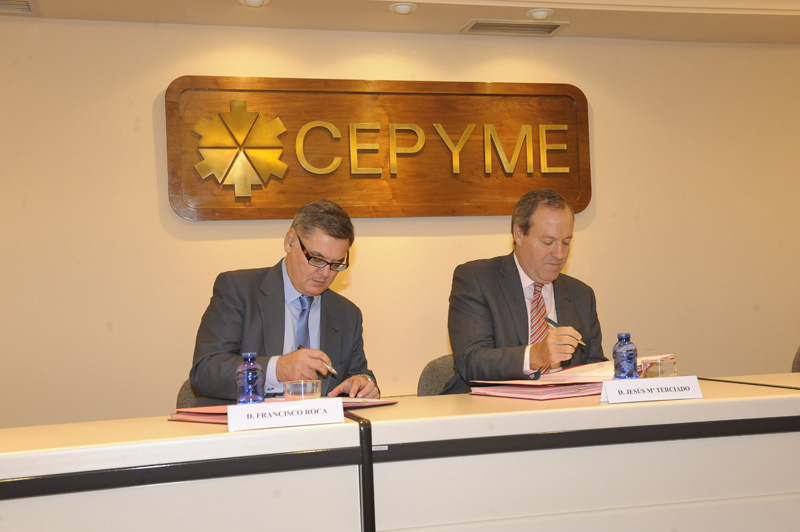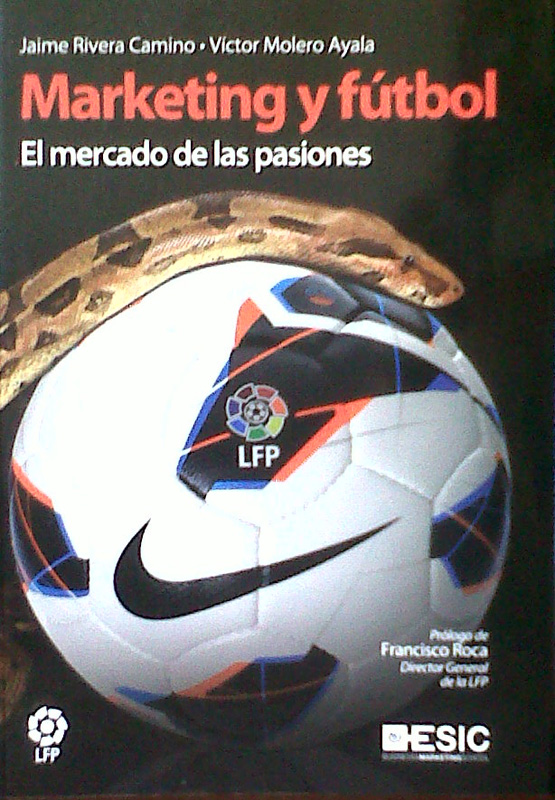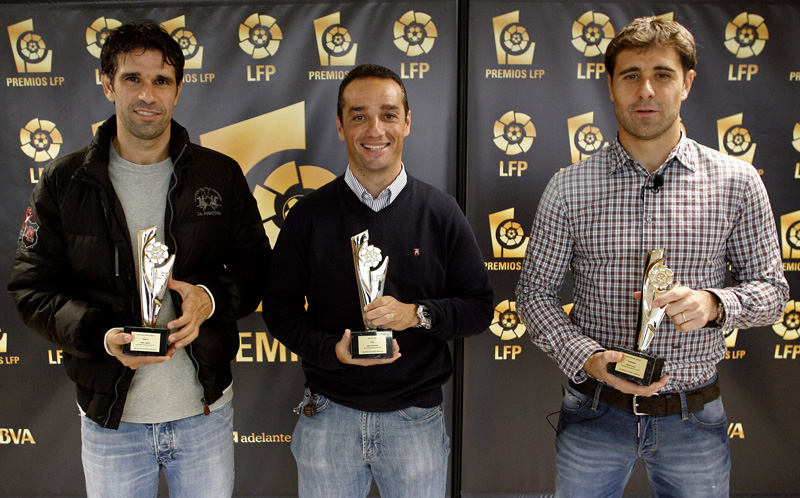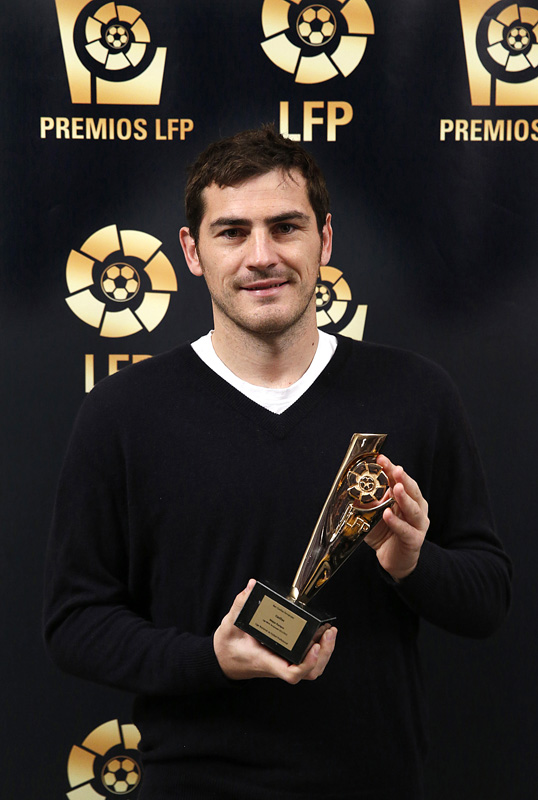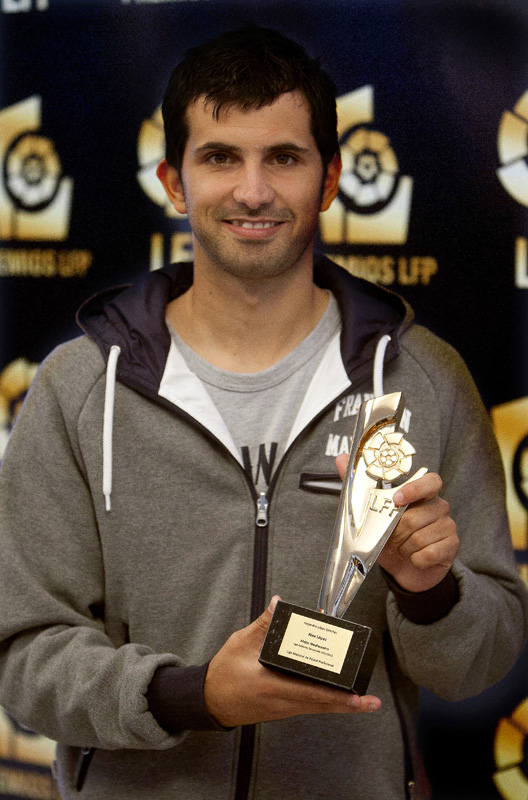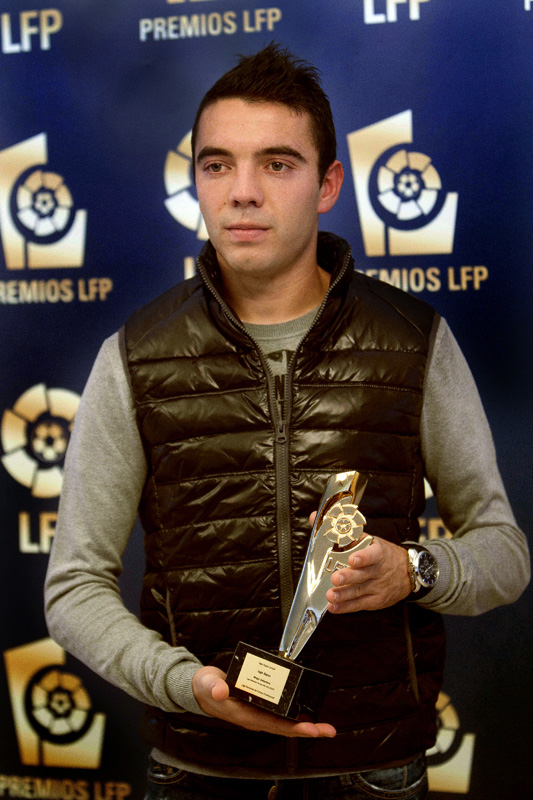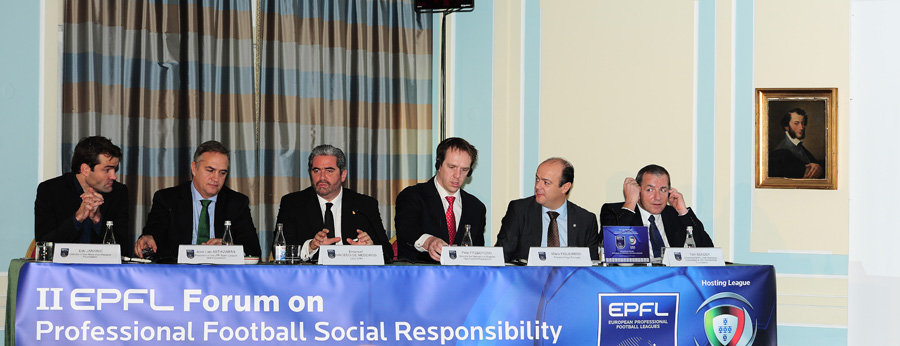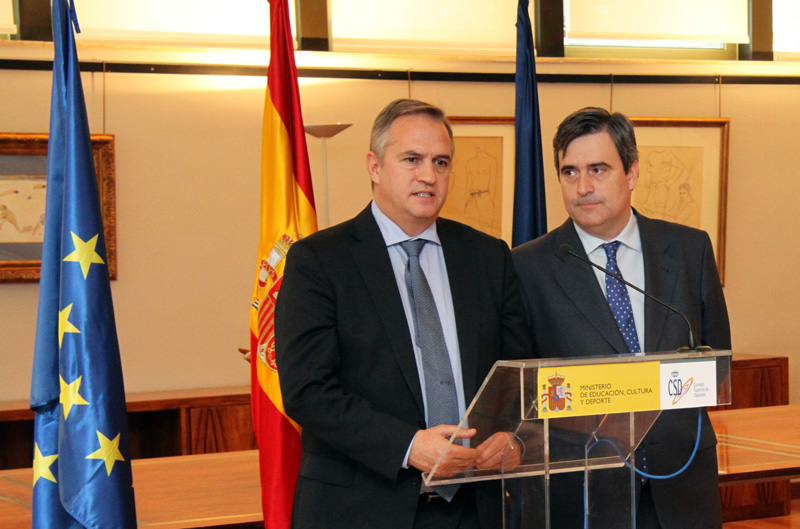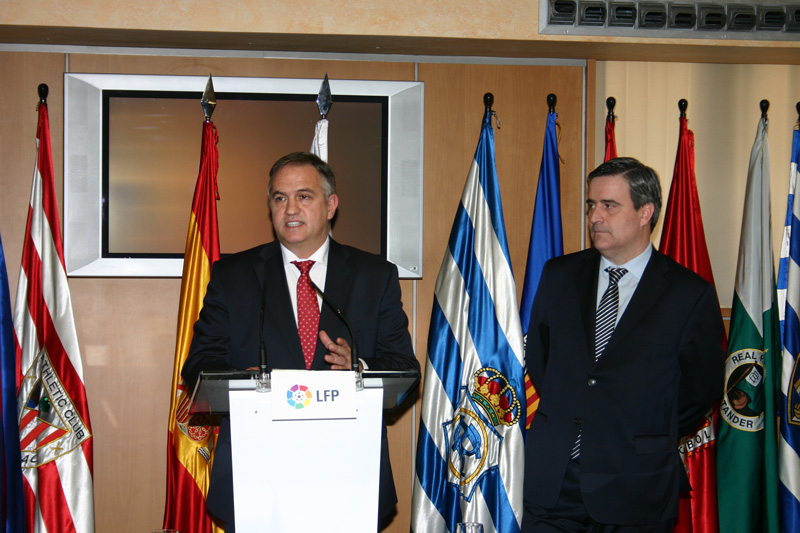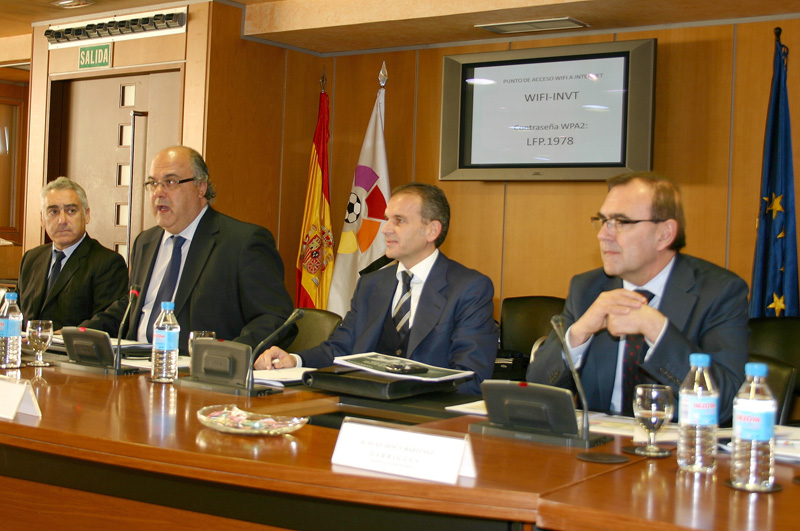Activities and Events
General Relations and Activities (2 of 4)
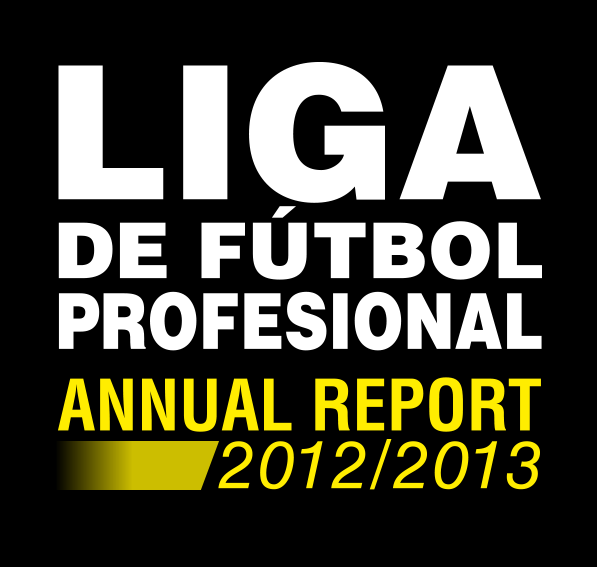
CEPYME and the LFP reached a collaboration agreement
CEPYME and the LFP reached a collaboration agreement
|
|
The Spanish Confederation of Small and Medium Enterprises (CEPYME) and Liga de Futbol Profesional (LFP) signed a collaboration agreement on the 27th of September 2012 in areas of common interest in order to carry out appropriate actions in those areas. CEPYME and the LFP identified and analysed collaboration formulas that channel and support marketing and corporate social responsibility as well as collaboration initiatives among their members. By virtue of this agreement, CEPYME and the LFP committed to carrying out a comprehensive analysis and assessment of the impact that the times of fixtures on the weekends have in the leisure sector in general and, in particular, in the hotel, restaurant and other industries where there is a major presence of small and medium enterprises. The chairman of CEPYME, Jesus Terciado, signed the agreement in representation of its association and Jose Luis Astiazaran and CEO Francisco Roca signed as representatives of the LFP. |
The LFP co-publishes the book 'Marketing y Futbol'
The LFP co-publishes the book 'Marketing y Futbol'
|
|
Liga de Futbol Profesional co-published the book "Marketing y Fútbol: el mercado de las pasiones" (Marketing and Football: a market of passion) which provides a necessary conceptual overview of the industry in order to understand the business details of the most popular sport in the world, with a huge amount of examples that illustrate the "what" "how" and "why" of what happens before, during and after matches. The book, written by lecturers Jaime Rivera Camino and Victor M Molero Ayala, looks with rigour and in an interesting manner to the perspectives of passion and economy in a sector in which football fans, as well as being passionate about their team and loving the show, are consumers of different types of products and services. Franciso Roca, CEO of the LFP, wrote the book's prologue, and opens the door to the also passionate world of marketing in the field of football. It makes for an essential read and it provides a necessary approach that had to be considered sooner or later. |
The LFP and the LAE presented a new campaign to promote La Quiniela
The LFP and the LAE presented a new campaign to promote La Quiniela
The National State Company of Lottery and Bets (SELAE) and Liga de Futbol Profesional (LFP) set up in November a campaign to promote the football pool La Quiniela.
Every week, a footballer or trainer of the Liga would fill in a football pool form and would challenge all the bet-makers to improve his result.
All the bets that managed to improve the result would take part in a draw. The prize was the unique experience of enjoying, with one guest, a football match of the winner's favourite team from within, that is, draw winners visited the interior of the stadiums, the pitch before the match started, accessed the press areas at the end of the match and viewed the match from the VIP area.
The LFP acknowledges the best players and trainers
The LFP acknowledges the best players and trainers
|
|
Liga de Futbol Profesional gave, one more year, its LFP awards to the best players and trainers of the 2011/12 season. Barcelona and Real Madrid were the main winners of the Liga BBVA awards, although Malaga's midfielder Isco was chosen Best Newcomer. Among Barcelona's winners were Messi, who once again became the Best Forward and Best Player in his category; Iniesta, who was considered the Best Midfielder, and Puyol was recognised with the BBVA award to Fair Play. As for the technical team, Guardiola received the Best Coach award. The Real Madrid winners were Casillas, who won the Best Goalkeeper award for the second time, Sergio Ramos (Best Defence) and Xabi Alonso (Best Centre Midfielder). In Liga Adelante, the event's winner was Deportivo FC, as it was given the awards to the Best Coach (Oltra), Best Player (Valeron), Best Goalkeeper (Aranzubia) and Best Midfielder, awarded to Guardado, who now plays for Valencia. Football from the Galicia region won even more prizes as Celta was given two awards, Best Centre Midfielder to Alex Lopez and Best Forward to Iago Aspas. The award to Best Defence in Liga Adelante was given to Barcelona's Marc Bartra for his season in the second team of that football club. The Best Newcomer award was given to Javi Hervas, now playing for Sevilla, due to his brilliant season in Cordoba. Moreover, Miguel Angel Corona received the BBVA Award to Fair Play in his category. The LFP awards are voted by the players and coaches of Liga BBVA and Liga Adelante. The best player and best coach are chosen by footballers, while the best player for each position is chosen by coaches out of a short-list made by the LFP's technical committee, made up of renowned coaches. The Fair Play awards are voted by fans through their federation of supporters. |
||||||||||||
|
|||||||||||||
Jose Luis Astiazaran attended in Lisbon the 2nd Forum on Social Responsibility of Professional Football of the EPFL
Jose Luis Astiazaran attended in Lisbon the 2nd Forum on Social Responsibility of Professional Football of the EPFL
|
|
The LFP's chairman Jose Luis Astiazaran attended on the 27th of November 2012 in Lisbon the 2nd Forum on Social Responsibility of Professional Football, organised by the Association of European Professional Football Leagues (EPFL). It was considered to be a top-level social responsibility event in the world of football. This second edition also had the attendance of representatives from the Portuguese league, which hosted the event, as well as the German Bundesliga, the English Premier League and the Italian league. During the event, which also had the attendance of football clubs’ foundations, the EPFL presented the most recent news related to its campaign "Professional Football Against Hunger" in a special session which had the participation of FAO director, of the chairman of "Banco Alimentar contra a Fome" and of the European Federation of Food Banks Against Hunger. The first edition of this event took place on the 8th of February 2011 in Dusseldorf as part of the international trade show SpoBis. |
The CSD acknowledged the effort, responsibility and solidarity of the LFP as it renounced to part of La Quiniela...
The CSD acknowledged the effort, responsibility and solidarity of the LFP as it renounced to part of La Quiniela takings in favour of Spanish sportl
|
|
The president of the Higher Sports Council (CSD) Miguel Cardenal stressed on the 18th of December 2012 "the good gesture and sense of responsibility" of football clubs, as well as their "desire to show solidarity with the world of sport" after they renounced to part of the takings they are entitled to from the football pool La Quiniela in favour of Spanish sport. Cardenal reiterated that this was "a provisional step that does not aim to become permanent" nor that the football teams will receive anything in exchange. The CSD president stated that the sacrifice made by professional football will allow it to respond to other needs in the world of sport, such as insularity aid, grassroots sports and school championships. Former chairman of Liga de Futbol Profesional (LFP) Jose Luis Astiazaran brought the attention, in turn, to "the effort made by all clubs, large, medium and small" to accept this great reduction in their revenues from the football pools. However, Astiazaran recalled that "whenever we are called upon we maintain the solidarity spirit and, because of it, we were able to reach an agreement. It seems to us that giving away some of our revenue to meet the needs of sport in general was necessary at this time and, our main interest, is sport at schools." |
The LFP collaborated with UNICEF's "Cumpledias" campaign
The LFP collaborated with UNICEF's "Cumpledias" campaign
Due to malnutrition, children are not able to reach their birthday days in many parts of the world. Thus, the LFP's Foundation joined in December UNICEF Spain's campaign "Cumpledias", which aimed to raise awareness among the Spanish population about the devastating consequences of children malnutrition and the importance of preventing it and dealing with it.
Severe malnutrition alters all the vital processes of children suffering from it and is the most serious consequence of hunger. Currently, 20 million children under the age of 5 suffer from severe malnutrition all over the world, entailing a high risk of mortality.
Changing the lives of thousands of kids is possible
Advances made are encouraging, infant mortality was reduced by 41% from 1990 to 2011, but 19,000 infants still die per day due to avoidable causes. This figure is unacceptable. The good news is that UNICEF knows that it is possible to change this reality and it has the technology and technical knowledge to obtain important improvements. The challenge is having the necessary resources to reach all children. The investment needed to achieve it is minimal and the results are spectacular. The figures are proof of this.
Liga BBVA was considered for third consecutive year the best league in the world according to the IFFHS
Liga BBVA was considered for third consecutive year the best league in the world according to the IFFHS
The Liga was named in January 2013 the best football championship of the world for third consecutive year and it increased its final scoring when compared to the previous year, according to the International Federation of Football History and Statistics (IFFHS).
The world ranking drafted by the IFFHS is based on the results obtained by clubs in the national competitions (Liga and Cup) as well as on the continental and intercontinental championships (FIFA and confederation championships). The Spanish Liga obtained 1283 points, followed by the Brazilian league with 1057 points and the German league with 1037 points, which ended third.
It is the seventh time, third consecutive time, that the Liga obtains this recognition since the IFFHS started drafting this ranking based on the results of clubs in national and international championships in 1991.
The Canarias Higher Court confirmed the LFP's interpretation of the public interest of football matches
The Canarias Higher Court confirmed the LFP's interpretation of the public interest of football matches
The Canarias Higher Court stated in a ruling dated 17th of January 2013 that it fully accepted the case brought against the state by Liga de Futbol Profesional against the state's consideration that the match Tenerife-Las Palmas, held on the 23rd of January 2011, was a match of public interest. The Canaries' government had ordered for the match to be offered in Freeview for the whole archipelago.
The ruling, which accepted each and every legal argument made by the LFP, cancelled the Order given by the department of culture and sport of the regional government and that was in fact published in the regional official gazette one day before the fixture of the 21st round of Liga Adelante in the 2010/11 season, that is, on Saturday the 22nd of January 2011.
More specifically, the court ruling, accepting the arguments used by the legal services of the LFP, stated that the regional Decree on which the order was based was repealed after the approval of the new national Broadcasting Law (Law 7/2010 dated 31st of March).
Moreover, and in agreement with the LFP's arguments made before the court itself and before the regional department for education, culture and sports, the ruling acknowledged that the Canarias regional government did not have material jurisdiction over the professional football competitions organised by the LFP. Thus, the highest legal body of the Canary Islands acknowledged that the regional government of the Canary Islands "had made an improper use of the abolished law", "extending the applicability of a law when that has not been regulated."
Slight reduction of attendance to LIGA BBVA stadiums
Slight reduction of attendance to LIGA BBVA stadiums
The first-leg period of Liga BBVA showed a slight decrease of 3.58% in attendance to stadiums compared to the previous season, which ended with the highest attendance of the last ten years. In fact, the 2012/13 season, if we look at the figures of the end of the season, proved to be the second best season in terms of attendance of the last 10 years, together with the 2010/11 and the 2005/06 season.
The total attendance in the first 19 matches of the season was 4,733,320 and the average per match was 24,912 spectators, 924 less than in the same period of the previous year.
Liga Adelante lost 570 spectators in average
In the case of Liga Adelante, the average per match fell by 570 spectators, from 7,038 to 6,468, a decrease of 8.10%.
The total number of fans in the first 21 matches was 1,358,334 while in the 2011/12 season it was 1,478,074.
The LFP approved the new Economic Control regulation in coordination with the CSD
The LFP approved the new Economic Control regulation in coordination with the CSD
|
|
The LFP's Delegate Commission meeting held on the 30th of January 2013 approved the economic control regulation and its implementation from the 1st of July 2013, and so it will be applicable from the 2013/14 season onwards. It aims to contribute to the financial and economic sustainability of professional football, preventing situations of imbalance. Thus, among other things, it sets a cost limit for sporting personnel, in order to guarantee the budgetary balance and it acts on the availability or not of players' registration by clubs and SADs. The Commission also discussed information on the changes to the General Law on Advertising and advanced further on the potential regulation of protocols for TV interviews.
"A priori" control In the LFP's assembly dated 12th of July 2011, the clubs approved the financing self-regulation to make sure that they could fulfil their financial commitments with players, the public administrations and suppliers. In 2012, a Joint Committee was created between the Higher Sports Council and Liga de Futbol Profesional to establish and regulate the monitoring and financial and economic control rules that were applicable to clubs and SADs of the LFP, promoting their solvency. The budgetary regulation approved, the so-called "a priori" control, can be summarised in the following: 1. INFORMAITON PRESENTATION DEADLINES Information will be presented, in general, no later than the 30th of April of the season prior to the one for which the budget is approved by the LFP. Special deadlines: Clubs and SADs that meet certain ratios will have one more month to present it, that is, until the 31st of May, and will be able to update it until the 31st of July of the season for which the budget is made. Clubs and SADs that are promoted to Liga Adelante or that are relegated from Liga BBVA will have to present again all the information and adapt it to their new category before the 20th of June of the season previous to the one the budget refers to. Clubs and SADs that are promoted from Second Division B to Liga Adelante will have until the 31st of July of the previous season to present the information so that it can be verified by the LFP. 2. INFORMATION NEEDED - Budget of income and expenditure.
Clubs and SADs that meet certain ratios considered to be acceptable may present an abbreviated income and expenditure budget. 3. PROCEDURE (I) First of all, the system established the rules that must be followed when budgeting the non-sporting income and expenditure. More specifically, it sets a maximum limit for the income based on recent history information or in already signed contracts and it makes it compulsory to demonstrate an expected reduction on non-sporting expenditure with at least a 10% decrease over the previous season. (II) Secondly, once the non-sporting income and expenditure have been set, due to the differences between them, it is imposed on the club or SAD a maximum cost on sporting personnel that prevents the team from incurring in losses in the forecast season due to its current activities. Moreover, it reduces the limit for sporting personnel for those clubs that have approved a Creditors' Agreement, taking into account the resources that must be generated according to that agreement so that they can pay back their bankruptcy debt and, on the other, it is also applicable to all clubs and SADs, for the losses from the two previous seasons. In accordance with this issue, no club or SAD can register players in the LFP whose cost make it go over the mentioned limit for sporting personnel. (III) Once the sporting personnel cost limit has been approved for each club or SAD, "cost limit increase windows for sporting personnel" are established if greater revenue or profit can be obtained. That is, if a club or SAD presented specific revenue from a TV contract and it was approved, if it signs a new contract for a higher value later on, the cost limit for the sporting personnel will be increased. (IV) Moreover, it establishes special circumstances when that limit can be increased: a.- If the contract is terminated with the coach or when a revalued player's contract is renewed, as long as there is a quantitative limit and providing that it takes into account the sporting cost limit for the next season. b.- in cases of relegation from Liga BBVA to Liga Adelante, whenever the cost of the players that have to be registered is not over 25% of those that have left. (v) Finally, information verification procedures are established and must be carried out in the audits of all clubs or SADs. 4.- ECONOMIC-FINANCIAL RATIOS CONSIDERED TO BE ACCEPTABLE The following 2 ratios must be fulfilled. (1) On the last audited season, net equity must be higher than 30% of the turnover in Liga BBVA and higher than 60% in Liga Adelante or, alternatively, the profit in that season must be at least 3% of the turnover. (II) On the 31st of December of the previous season to the one being budgeted, the current liabilities due in less than two years, reduced by treasury or similar, must not have a coefficient higher than 1.25 of the turnover of the previous season audited for Liga BBVA and higher than 0.9 for Liga Adelante. |
Increase of licences, of Spaniards' licenses and of loans at the end of the registration period
Increase of licences, of Spaniards' licenses and of loans at the end of the registration period
At 24:00 on Thursday the 31st of January 2013 the second period to register players ended, with a total of 107 new licences processed, 44.5% more than those registered on the same period of the previous season, when 74 were recorded.
Moreover, there was a considerable increase in the number of loans, which went from 19 to 42 (121% more). Contrary to that, transfers remained low, 9 this year compared to 5 recorded last year.
It is also worth mentioning the repetition of last season's trend with regard to the increase in the licenses of Spanish players, that went from 47 to 72 (36 in 2011). The return to Spanish football of Spanish footballers that had been abroad was also significant.
However, this January the number of EU footballers being hired increased to the same level of 2011, 24, whereas last season only 10 were recorded.
With regard to non-EU footballers (11), the number of registrations decreased when compared to 2012 (17) and was also below that of 2011 (13).
The first year, with 521 new licences, less transfers and more loans
In turn, 521 new licenses were registered during the first registration period of the 2012/13 season, which closed at midnight of Friday the 31st of August 2012. The number of registrations exceeded that of the previous season, when 471 took place. One of the reasons may be the changes to the regulation that forces all Liga Adelante clubs to have, at least, 16 professional footballers in their team.
According to nationalities, the licences were for 392 Spaniards, 82 EU players and 47 non-EU players. In 2011/12, those figures were 357, 69 and 45 respectively.
On the other hand, there was a decrease in the number of transfers from 56 last season to 35 this season, whilst the number of loans increased from 47 to 56.
Exchange of experiences and points of view of marketing managers of the LFP clubs
Exchange of experiences and points of view of marketing managers of the LFP clubs
|
|
On the 29th of January 2013, the LFP held a working seminar for the marketing managers of clubs. During that seminar there was an exchange of experiences and points of view on different common topics. The agenda focused on the LFP's sponsorship plan, and on collaboration with the Liga's title sponsor, giving an update and sharing viewpoints on that matter. Moreover, there was a discussion on potential interview formats for TV operators and an analysis was made on stadiums' spectator data, exchanging experiences to boost them. |
The LFP held a seminar on new tax measures and their impact on professional football
The LFP held a seminar on new tax measures and their impact on professional football
|
|
On the morning of the 15th of February 2013, a seminar was held at the headquarters of the LFP on the recently approved tax measures and their impact on professional football. Through various presentations, issues such as the limits set for tax-deductible amortisations, limits to deducting expenses arising from compensation after terminating working relations with players or coaches, balance updates, limits to deducting financial costs, minimum instalment payments and, finally, having to inform on assets abroad. Those talks were presented by famous law professionals such as Gonzalo Gallardo, Juan Jesús Martínez and Félix Plaza, experts on giving advice to football clubs and members of the tax departments of Madrid and Valencia. The seminar started at 10 am and it was officially opened by the LFP's secretary general Carlos del Campo. Representatives from most Liga BBVA and Liga Adelante clubs were present. |
